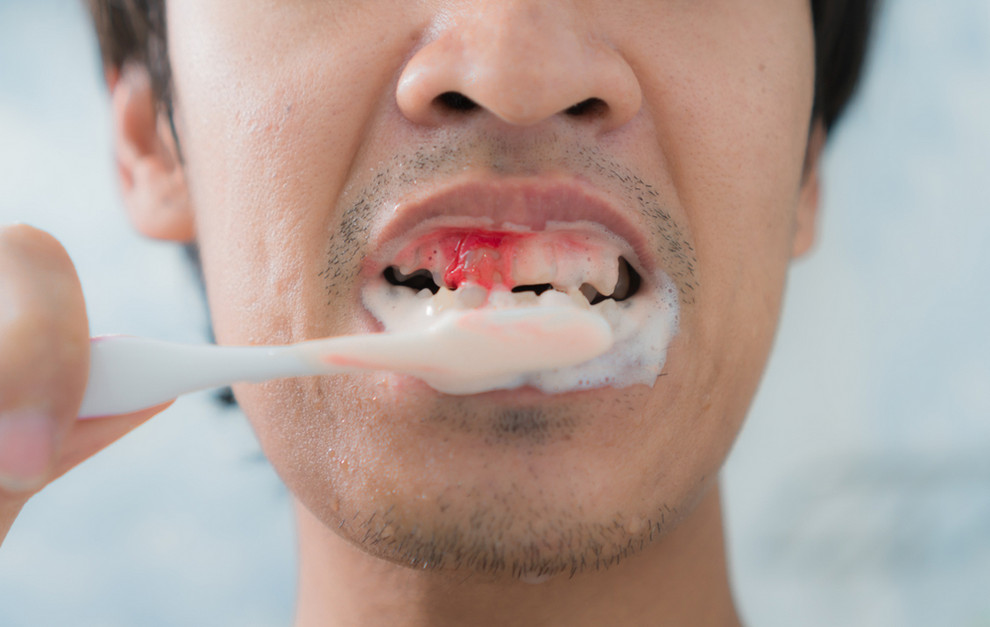Dealing with Bleeding Gums While Brushing Teeth
Are your gums bleeding when you brush your teeth? This can be a sign of an underlying dental problem that needs to be addressed. Bleeding gums can be caused by several factors, including poor oral hygiene, gum disease, vitamin deficiency, and rough brushing. If left untreated, bleeding gums can lead to more serious health issues such as periodontitis, tooth loss, and even heart disease.

The Causes of Bleeding Gums
Poor Oral Hygiene
One of the most common causes of bleeding gums is poor oral hygiene. When you don't brush and floss regularly, plaque and bacteria build up on your teeth and gums, causing inflammation and bleeding. To prevent bleeding gums, it's important to brush your teeth twice a day with a soft-bristled toothbrush and floss at least once a day.
Gum Disease
Gum disease, also known as periodontal disease, is a more serious condition that can cause bleeding gums. It occurs when the bacteria in plaque build up and infect the gums, causing inflammation and bleeding. If left untreated, gum disease can lead to tooth loss and other serious health problems. If you suspect you have gum disease, it's important to see a dentist as soon as possible.
Vitamin Deficiency
A lack of vitamin C and vitamin K in your diet can also cause bleeding gums. Vitamin C is essential for healthy gums, as it helps to strengthen the blood vessels and prevent inflammation. Vitamin K is important for blood clotting, which helps to stop bleeding gums. To ensure you're getting enough of these vitamins, eat a diet rich in fruits, vegetables, and whole grains.
Rough Brushing
If you brush your teeth too hard or use a toothbrush with bristles that are too hard, you can cause damage to your gums and make them bleed. It's important to use a soft-bristled toothbrush and brush gently in a circular motion.
Tips and Tricks to Deal with Bleeding Gums
Use a Soft-Bristled Toothbrush
As mentioned earlier, using a soft-bristled toothbrush can help prevent bleeding gums. Brush your teeth gently in a circular motion, making sure to brush all surfaces of your teeth and gums.
Floss Regularly
Flossing helps to remove plaque and bacteria from between your teeth and gums, reducing inflammation and bleeding. Make sure to floss at least once a day, and use a gentle back-and-forth motion to avoid damaging your gums.
Rinse with Salt Water
Rinsing with salt water can help to soothe inflamed gums and reduce bleeding. Mix a teaspoon of salt with a cup of warm water and swish the solution around in your mouth for about 30 seconds.
Use an Antiseptic Mouthwash
An antiseptic mouthwash can help to kill bacteria in your mouth and prevent gum disease. Look for a mouthwash that contains chlorhexidine or cetylpyridinium chloride, and use it after brushing and flossing.
Eat a Healthy Diet
Eating a diet that is rich in fruits, vegetables, and whole grains can help to provide your body with the vitamins and nutrients it needs to maintain healthy gums. Avoid sugary and acidic foods, as they can cause damage to your teeth and gums.
The Pros and Cons of Dealing with Bleeding Gums
Pros
- Prevent gum disease and other serious health problems
- Improve overall dental health
- Reduce inflammation and bleeding
- Boost self-confidence
Cons
- Requires time and effort to maintain good dental hygiene
- May require additional dental procedures if gum disease is present
- Some people may experience discomfort or sensitivity while brushing and flossing
FAQs
Q: Why are my gums bleeding when I brush my teeth?
A: There are several reasons why your gums may be bleeding when you brush your teeth, including poor oral hygiene, gum disease, vitamin deficiency, and rough brushing.
Q: How can I prevent bleeding gums?
A: To prevent bleeding gums, it's important to brush your teeth twice a day with a soft-bristled toothbrush, floss at least once a day, and eat a healthy diet that is rich in fruits, vegetables, and whole grains.
Q: Is it normal for my gums to bleed when I floss?
A: It's not uncommon for your gums to bleed when you first start flossing or if you haven't flossed in a while. However, if your gums continue to bleed after a few days of flossing, you should see a dentist.
Q: Can bleeding gums be a sign of something more serious?
A: Yes, bleeding gums can be a sign of an underlying dental problem such as gum disease or vitamin deficiency. If left untreated, these conditions can lead to more serious health issues such as tooth loss and even heart disease.
Dealing with bleeding gums while brushing teeth can be a frustrating and uncomfortable experience. However, by following these tips and tricks and maintaining good dental hygiene, you can prevent bleeding gums and improve your overall dental health. Remember to see a dentist if you suspect you have gum disease or if your bleeding gums continue to persist.
